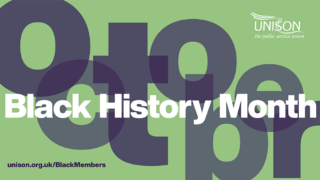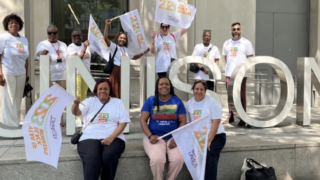But we don’t have time for the government to wake up and act and that is why the report prepared by Baroness Doreen Lawrence, An Avoidable Crisis, is so vitally important. It sets out a clear pathway with both immediate and long term recommendations to start challenging inequality and protecting Black people as we navigate this pandemic. The report sets out twenty immediate and long term recommendations and as trade unionists, we must play our part, big or small, in supporting these recommendations and taking them back into our workplace.
The report includes twenty recommendations, each of which contribute to both tackling the current crisis whilst also considering the long-term structural inequalities and discrimination that have contributed heavily to the crisis.
There are six recommendations in particular that as a union and a region we can use our influence and collective voice and contribute to immediately:
Recommendation 1: The Government must go further and set out an urgent plan for tackling the disproportionate impact of Covid on ethnic minorities this winter
The plan has yet to be produced and the disproportionate impact is still being felt, leaving Black Communities without support from the government.
Action: Branches should actively reach out to members, letting them know that UNISON is here for them and will ensure that they are safe at work and all employers have appropriate plans in place.
Recommendation 2: A national strategy to tackle health inequalities
This recommendation includes reference to the Marmot review and includes nine points that should be included in the strategy.
Action: Health branches can seek to work with their employers to request a commitment, formal meetings, and action plans to start to tackle three key parts:
- Improved training for all health and care staff to tackle racism, unconscious bias, understand cultural differences
- Every trust have a race equality strategy
- Commitment to engage with staff on how lessons learnt from pandemic can be applied to NHS
Recommendation 4: Ensure Covid-19 cases from the workplace are properly recorded
Employers have been advised not to register deaths during pandemic because in claims contact with public not “sufficient evidence that they could have resulted from virus”
This makes it harder to understand and track the impact on Black workers and identify and tackle any patterns, preventing intervention or additional safety measures.
Action: H&S reps and activists on employer H&S committee should urgently ask how each employer is recording COVID related deaths and put pressure on employers to report in line with RIDDOR.
Recommendation 5: Strengthen Covid-19 risk assessments to ensure consistency and to give workers more confidence
All employers with more than five staff are required to produce written risk assessments, and employers with over 50 staff are expected to publish these on their own website. However, many employers fail to do so.
Action: Check that all employers in the branch are complying, including private & voluntary organisations, targeting those that are not.
Ensure that all risk assessments are comprehensive and that UNISON have had the opportunity to input and that Black members have been consulted, supporting them in contributing.
Distribute UNISON guidance on risk assessments to all reps and support H&S reps in accessing UNISON training.
Recommendation 6: Improve access to PPE in all high-risk workplaces
This links with a key UNISON priority and focus throughout the pandemic. This is additionally important for Black members, particularly in terms of ensuring that PPE is appropriate for all staff, for example for those who wear hijabs, turbans or have beards for religious reasons.
Action: Continue to work with employers to identify appropriate PPE and support members in raising individual concerns and requesting individual risk assessments as appropriate.
Recommendation 15: Implement a race equality strategy
Whilst the report rightly calls for action from the government in addressing this as a national issue for all public bodies, there are actions that can be started at a local level in the meantime.
Action: Request your employer conduct a race audits and produce a roadmap to improve the recruitment, retention and progression of Black, Asian and minority ethnic people. In doing so, Black Members should be fully involved and consulted alongside trade union representatives.
Monitor the implementation of the public sector equality duty to ensure proper compliance
Recommendation 17: Introduce mandatory ethnicity pay gap reporting
UNISON has called for this previously and continues to support this, it is clear from the pandemic that high level representation of Black workers is key to understanding and addressing key structural and socio-economic inequality. 20% of the NHS workforce are Black, yet only 6.5% of senior NHS managers are Black.
Action: Ensure that ethnicity data is appropriately captured and recorded. Request that each employer voluntarily produce an ethnicity pay gap report and seek to work with them to produce an action plan, alongside the annual gender pay gap report.



